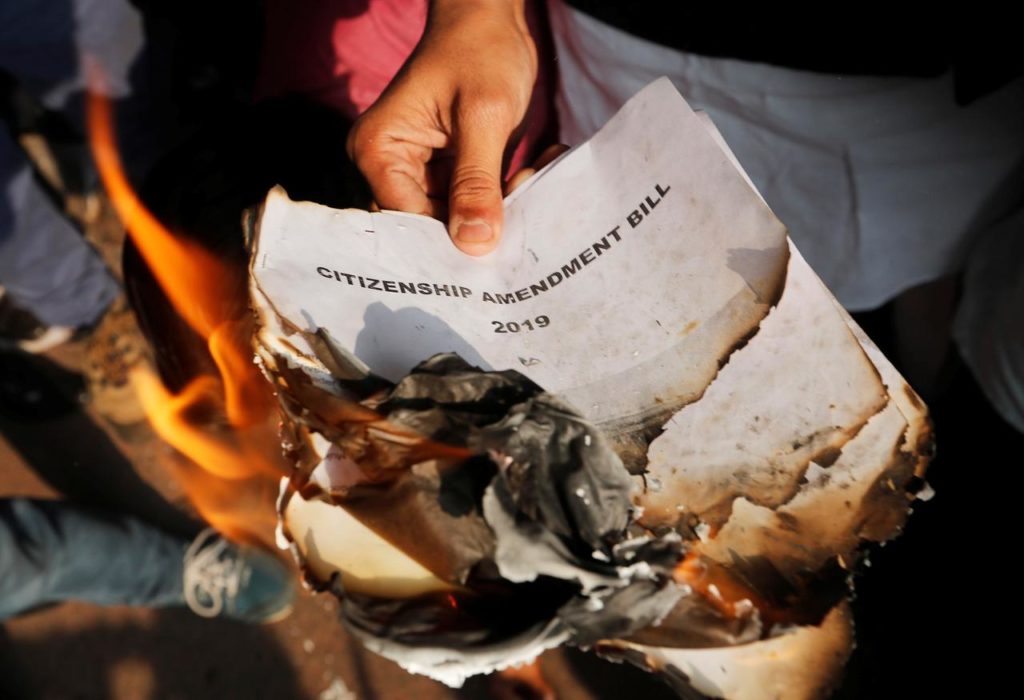The Growing Global Statelessness Crisis
Jun 21, 2022 | Pratirodh Bureau
Demonstrators burn copies of the Citizenship Amendment Bill, that seeks to give citizenship to religious minorities persecuted in neighbouring countries
With refugee populations growing, the spotlight is intensifying on nations that cast out the stateless – people who do not have citizenship to any country.
The world’s refugee population has more than doubled over the past decade. Statelessness is on the rise. As the first group of stateless refugees emerges from Ukraine following Russia’s invasion, countries around the world will once again be forced to reckon with their policies about refugees. A ‘stateless person’ is defined by the United Nations as someone who is not recognised as ‘a national’ by any state under ‘the operation of its law’.
The recent growth in statelessness is rooted in the way people are rendered stateless: refugees are less often being stopped at borders, so governments are using this to justify policies that cast out refugees – leaving them without a safe home to return to and no destination to welcome them. Statelessness is the destiny of many refugees.
Conferred in the UN Universal Declaration of Human Rights, the right to a state is an ironclad human right that cannot be taken away or changed ‘arbitrarily’.
However, the declaration is silent about those who, from the beginning, have stayed in a country where they are not considered to be one its lawful citizens, and who are not considered a lawful citizen of any other country.
There are many examples of legal changes depriving citizens of their right to a state en masse. The spectre of losing citizenship haunts more than 1.9 million people whose names were struck off the National Register of Citizens (the Register) in Assam, India, in August 2019.
Most of them were, until then, treated as citizens for all practical purposes, and many even voted in elections. The exercise marked a radical change in the way citizenship was understood and implemented in India.
Soon afterwards, in December 2019, India’s Parliament passed the Citizenship Amendment Bill. The Bill and the Register are closely interconnected: the Bill aims to ‘re-citizenise’ immigrants belonging to certain minority groups and communities on the basis of their religion who had been struck off the Register and were facing deportation.
These ‘minority’ refugees are restricted to six communities: the Hindus, Sikhs, Christians, Jains, Parsis and Buddhists who migrated to India from Afghanistan, Bangladesh and Pakistan before 31 December 2014. The absence of Muslims – India’s largest minority — is a glaring omission.
India’s policy has been accused of being discriminatory and cutting into the secular principle of India’s nationhood. Bangladesh maintains that not a single Bangladeshi national has been resettled in India. Pushing immigrants back to their countries of origin has never been easy, logistically or politically. Instead, they are sent to various detention centres as long as the issue is not settled. With no easy solution in sight, all the concerned parties are playing a waiting game.
The problem with statelessness lies in its circularity: since the legality of statelessness is established by ‘the operation of the law’ of the land, legal recourse on the part of a stateless person is impossible. It is, to say the least, a human problem.
While today’s world is built on the binary between citizens and the stateless, particular groups and communities of citizens are known to suffer from what may be called ‘de facto statelessness’ – a condition that implies even so-called citizens are unwilling or unable to avail themselves of the ‘protection’ of their country.
In 2020, marginalised groups, including members of the queer community, trafficked women and sex workers, staged a peaceful demonstration in New Delhi’s Jantar Mantar. They had left behind the documents necessary to get their names included in the Register, and were not allowed to return home and access them. Their protracted statelessness makes them vulnerable to many other kinds of disability and bondage.
Many stateless people are made to serve literally as bonded and slave labour, suffer discrimination, face hate attacks and are mistreated by police. It is difficult to say if the condition of statelessness adds to other vulnerabilities or if people are subject to statelessness because they suffer from other vulnerabilities.
The Chakmas, a tribal group from India’s easternmost regions, fled to the state now known as Arunachal Pradesh in 1962 after they were evicted from their homes by the construction of the Kaptai hydroelectric dam in Bangladesh’s Chittagong Hill Tracts. The construction submerged 50,000 acres of cultivable land and displaced over 100,000 people.
Once they become stateless, many people are pushed into what psychoanalyst Julia Kristeva calls ‘abjection’ – a condition that takes away the right to articulate their rights claims ‘under the operation of the existing law’ and therefore ‘beseeches a discharge, a convulsion, a crying out’.
While sincere state-level discussions may help end the problem, third-country asylum – though effective – is usually only granted in cases where the number of stateless parties is too small. For instance, about 100,000 Lhotshampas displaced from Bhutan as a result of the government’s policy of ‘Bhutanisation’ have been given asylum across Australia, Canada, the United Kingdom and the United States since 2007.
Legal and diplomatic solutions have their limits, but a series of humanitarian experiments have taken place in different parts of the world. Several solidarity groups in Greece, for instance, turned abandoned spaces into squats for housing refugees on an antiracial, non-hierarchical and self-management basis.
The government evicted the occupants of many of these squats in 2019 because it considered them illegal settlements. Statelessness is a human problem with no easy end in sight. Power rests with the nations that make policy dictating whether a refugee has a nation they can call home. Communal approaches – such as the squatting seen in Greece – can only provide temporary relief for a much larger issue.
(Originally published under Creative Commons by 360info)
